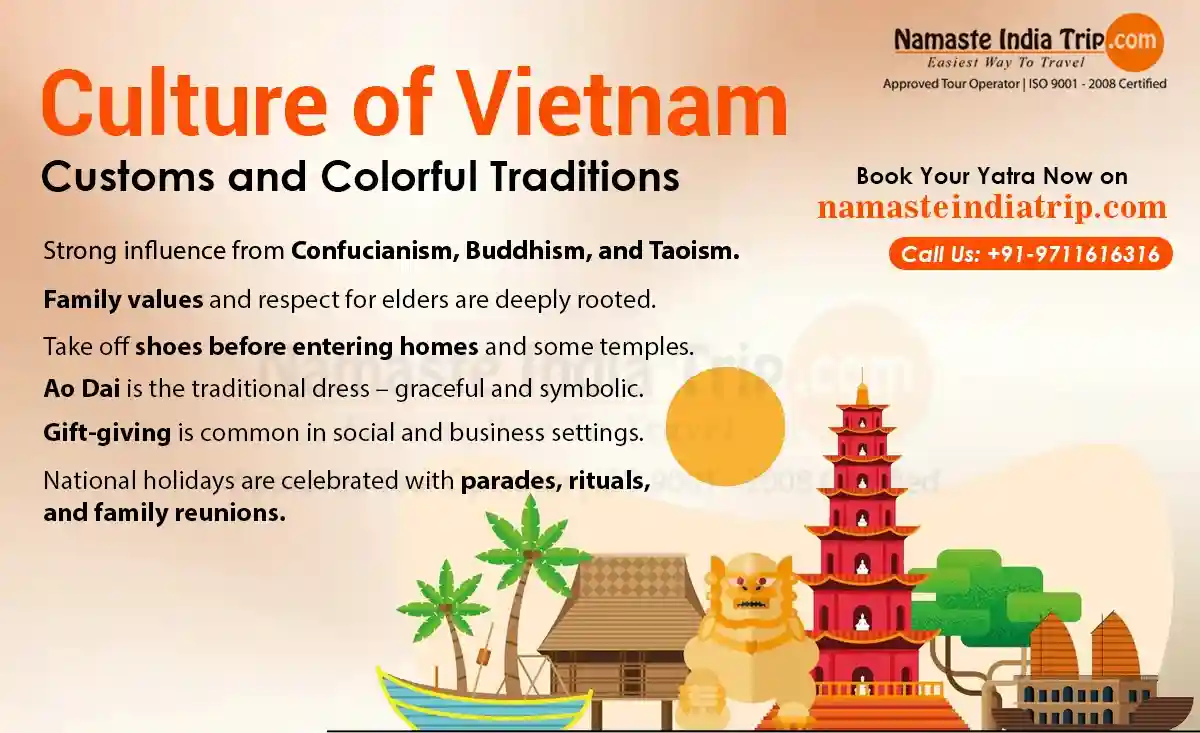Vietnam is known for its rich culture and tradition. Vietnamese culture is influenced by the cultures of China, France, and neighbouring Cambodia. Although located in Asia’s south-eastern part, Vietnam has been under the rule of China, and hence its culture has lots of similarities to that of China. Whether you’re indulging in world-renowned cuisine, exploring historic districts, or participating in colorful festivals, you should understand the culture of Vietnam to enrich your visit and navigate the local customs effortlessly. In this article, we will help you understand the best things about Vietnamese culture that you need to know.

Things You Must Know About the Culture of Vietnam
Ghosts are real
Many Vietnamese customs and traditions are based on their ancestral beliefs. In Vietnam, one of the greatest fears is that the dead won’t be able to get peace in the afterlife. This means they will have to wander as tortured spirits. In Vietnam, most people have a ghost story: from strange voices at night to a butterfly landing on them at the time of a funeral. Irrespective of your thoughts and opinions on the supernatural, don’t take ghosts lightly when in the country.
Vietnamese People are Optimistic
In Vietnam, people like to think positively and make the best out of unfortunate situations. People work hard a lot to improve themselves and their families’ lives with the belief that long hours today will give lots of benefits later. You won’t find many people in the country grumbling or complaining about their hardships, so you should take care not to complain about your personal or professional issues too much.
Elders are Respected
After nationality and name, age is one of the first questions that people ask in Vietnam. Their society is mainly based on Confucian beliefs, where wisdom and experience are highly respected. This means older people in the country command more respect. When you’re with older people, you shouldn’t bring up inappropriate topics, such as sex or death. At dinners, the Vietnamese like to serve the eldest people first, and at work or home, their opinions hold immense value.
Languages in Vietnam
The main language in Vietnam is Vietnamese, which is highly influenced by Chinese. The Vietnamese language also has influences of French (because of the colonial past) and English, and Russian (because of the respective combatant forces that were quite evident during the Vietnam War). Other languages apart from Vietnamese include Tay, Khmer, Cham, and Muong, which various ethnic groups speak here. Foreign languages like French and Chinese are also understood well by the locals. In the urban parts of Vietnam, when travelling, tourists may not have to deal with much of a language barrier. However, you may have to face an issue if you plan to travel to Vietnam’s rural areas.
Vietnamese Dining Etiquette
Mealtimes and food, especially dinner, play an important role in Vietnamese culture. One dining etiquette is that your rice bowl shouldn’t be filled to the brim, as this is reserved typically for offerings at pagodas. You need to go ⅔ of the way, and for a refill, you should head later. Besides, you need to have some appetite left for all the delicious dishes!
When dining, you will most likely be served the most delicious dishes first. Accepting and finishing them is considered to be respectful. The same goes for any alcohol or tea offerings. Many dishes are made with strong ingredients such as mam tom (shrimp paste) or fish sauce. If you cannot eat them or are allergic to them, Vietnamese people will understand. However, you will have to make it clear before arriving for the dinner/lunch to the host. Before you start eating, you are expected to say “mời”, a common Vietnamese expression which means ‘Bon Appétit’.
When you’re eating, sounds are considered to be an important part of Vietnamese eating etiquette. Sucking and slurping sounds, ulike in other cultures, are considered to be ways to cool down food and expressions of enjoyment. So, when you’re ready to tuck into your bowl of noodle soup, know what to do.
Dating and Relationship Etiquette
Despite the Western-style malls and glitzy exteriors, the Vietnamese are still quite conservative in terms of public affection. You should avoid kissing or hugging in public, especially if a local is present around you. As for dating, you need to be interested in their culture, and put some effort to learn some Vietnamese. Many Vietnamese women give immense prominence to chivalry, so if you’re being invited by someone, for the first few dates, you should be ready to pay the bill. Do so in a non-showy way. If things progress, you should meet their family and parents.
Conclusion
As you explore Vietnam, pay your respect to Vietnamese culture and traditions. From respecting the elders to being optimistic, avoiding hugging and kissing in public, you should follow the Vietnamese etiquette. This will help you have the best experiences and a chance to mingle with the locals.
Also Read:



 Call
Call WhatsApp
WhatsApp Enquiry
Enquiry